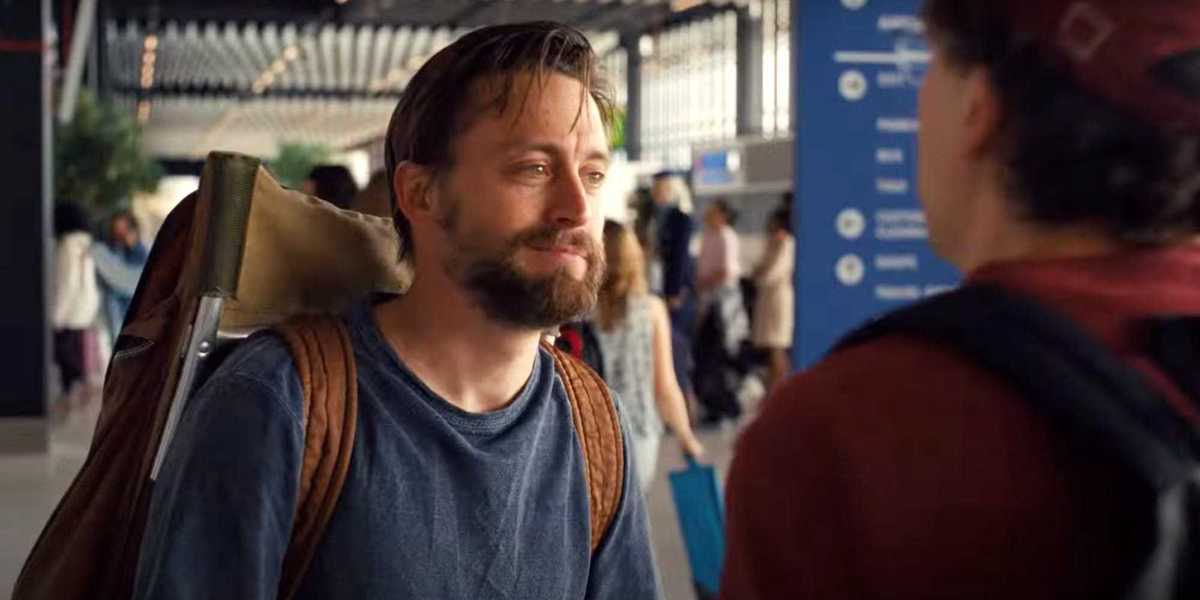A Real Pain Ending Explained: Where Benji & David's Relationship Stands
This article contains mention of suicide.
A Real Pain has an ambiguous ending after its equally hilarious and sobering story. Jesse Eisenberg directs, writes, and stars in the comedy-drama film. He plays the reserved and anxious David Kaplan, who travels to Poland with his charismatic and troubled cousin Benji Kaplan (Kieran Culkin). They join a Holocaust tour group and also intend to visit the home where their grandmother lived during her time in Poland. A Real Pain's reviews have been overwhelmingly positive since the movie first debuted at the 2024 Sundance Film Festival.
Eisenberg has received acclaim for his direction, writing, and for his portrayal of David, with the film proving to be one of the many high points in Eisenberg's career. A Real Pain has also proven to be one of Kieran Culkin's best movies, which led to him winning a Golden Globe Award for his performance. David and Benji's relationship, which was already strained, is put to the test throughout their travels, and builds to a largely open-ended conclusion.
Why Benji Is Still At The Airport In A Real Pain’s Ending
There Are Several Interpretations
After returning from Poland, David suggests that Benji come home with him or that they at least share a taxi together. Benji declines these offers and tells David that he will stay at the airport for now. A Real Pain's final shot sees Benji still sitting at the airport and glancing around at various strangers. While the ending is intentionally ambiguous, Benji still being in the airport indicates that he still feels displaced, unsure of how to move forward with his life, and needs more time to work through his emotions before taking the next step forward.
A Real Pain is now streaming on Hulu.
It is possible that Benji is also still at the airport because he is homeless. At the beginning of the movie, he has already been at the airport long before David arrives, and whenever David tries to call Benji's phone, he is always unreachable. Culkin has another interpretation of the ending that he shared at the 2024 SCAD Film Festival (via Blavity), which is that the final shot is what David imagines happening to Benji after leaving him, as he is afraid of imagining what Benji may do next after leaving the airport.
What David And Benji Find At Their Grandmother’s Home In Poland
It Does Not Go As Planned
After spending the majority of their movie with their tour group, David and Benji part ways with them to visit the home where their grandmother grew up. Neither cousin is sure about what they expected to find, but the house proves to be unremarkable. However, it does elicit a memory from Benji of their grandmother slapping him once, which he claims is the best thing that ever happened to him. David suggests that they put a rock on the home's stoop to commemorate that they were here. He gets this idea from the Jewish tradition of putting rocks on graves.
David and Benji's grandmother lived in the Polish town of Krasnystaw.
Putting rocks in front of the home grabs the attention of a neighbor who does not speak English, requiring his son to translate. The cousins clarify that they put the rocks there as a sentimental gesture while the son explains that, regardless, they need to move the rocks as they are a hazard, and the elderly woman living in the home now may trip over them. Like much of the movie, the trip to the grandmother's home does not go as planned, and does not provide the closure that is expected.
Why David Stopped Visiting Benji Before A Real Pain
Responsibilities And Tragedy Caused Them To Drift Apart
When David and Benji were younger, they were quite close and used to do everything together, a fact that Benji mentions to the other tour group members early on. As they grew older, their relationship changed as David focused on his wife, child, and his career, and Benji struggled to find his way. David stopped visiting Benji, and they began drifting further apart six months before their trip to Poland when Benji tried to take his own life via sleeping pills.
The cousins have an emotional hug in their final scene together, and the trip has brought them closer together again, but there is still a great deal they both need to work through.
David could never stop picturing the sight of Benji passed out on the couch after his overdose. He is haunted by this image, is consumed by fear of what Benji will do, and cannot bring himself to be around his cousin for months. From expressing these feelings to offering Benji to come home with him, David tries to make amends. The cousins have an emotional hug in their final scene together, and the trip has brought them closer together again, but there is still a great deal they both need to work through.
How Benji Changes Future Holocaust Tours
James Applies Benji's Feedback
During their tour of Poland, the tour guide, James (Will Sharpe) and fellow tour member Eloge (Kurt Egyiawan), spend a great deal of time sharing the extensive facts that they know about the Holocaust, Poland, and the history of the Jewish people. Benji's frustration with this reaches a breaking point when the group is at a Jewish cemetery. He criticizes James for having the tour treat the devastation of the Holocaust as if it is little more than a list of facts and statistics, and that there should be more emphasis on authentic connection and emotion to the history.

This House Of The Dragon Actor Was The Secret Star Of 2024
One House of the Dragon actor plays a vital role not only in the HBO series, but in two other projects that are among the best stories of 2024.
When the group later goes to the Nazi concentration camp of Majdanek, James takes Benji's words to heart by choosing to only offer minimal information, and to allow the group to more silently and authentically walk through the camp where countless horrors once happened. Before David and Benji leave the group to visit their grandmother's home, James expresses to Benji that he is grateful for the honest feedback that has changed his perspective and how he will lead Holocaust tours in the future.
The Real Meaning Of A Real Pain’s Ending
The Human Condition Is Complex
A Real Pain's characters navigate a story that asks difficult questions without providing easy answers. Some of these questions are specific to the Holocaust, with Benji's criticism highlighting the dangers of Holocaust tourism that has the dangerous potential of dehumanizing the real suffering and history of what really happened. Studying and revisiting this history is intertwined with a personal and collective grief, which is further amplified by the grief that David and Benji are experiencing from their grandmother's passing, and that they are are trying to process in their own ways.
A Real Pain Tomatometer Score | A Real Pain Popcornmeter Score |
|---|---|
96% | 81% |
In addition to asking difficult questions about the Holocaust and about grief, the film asks about questions of identity and pain. David tries to bury his pain and focus on his responsibilities because he believes his pain is unremarkable, while Benji deals with his pain in often self-destructive ways. They try to connect with their roots as they reconcile with their identities, but as seen with the scene at their grandmother's home, it is not as straightforward as they thought it would be. A Real Pain asks challenging questions about the human condition that can never be completely answered.
How A Real Pain's Ending Was Received
A Mixed But Mostly Positive Reception
The A Real Pain ending has prompted a wide range of responses from critics and audiences, underscoring Jess Eisenberg’s film's complex narrative choices and their varied impact on viewers.
Those who enjoyed the A Real Pain ending praise the story, including its climax, emotional resonance and thematic depth. However, they also note that it’s the character-driven core of A Real Pain that makes the story more memorable, rather than any specific events in the plot. For example, Wendy Ide of The Guardiannoted the importance of David and Benji as characters being the definitive aspect of A Real Pain, and not its narrative as such:
“The charged bond between the cousins is the heart of the film. Close since childhood, theirs is a loving but conflicted relationship that, for reasons which become clear, has grown increasingly fraught of late. Equally revealing is the way they relate to the world around them. David loiters, painfully self-conscious, on the periphery of conversations; Benji plunges in with abandon and emerges with shared secrets and potted life stories.”
However, while many critics appreciated A Real Pain and its incredibly character-driven story, the praise wasn’t universal. There are a few reviews that cite the ending of A Real Pain as a fault. Some critics found that the A Real Pain ending introduces abrupt narrative shifts that disrupt the story's flow.
Still, despite there being some who didn’t respond fully positively, A Real Pain has still garnered significant accolades, particularly for its screenplay and performances. The film received four nominations at the 82nd Golden Globe Awards, with Kieran Culkin winning Best Supporting Actor. What’s more, the screenplay of A Real Pain is (at the time of writing) nominated for an Academy Award.
While it’s not the defining aspect of the movie, theA Real Pain ending has been cited as a strength/weakness in both positive and negative reviews. Its emotional depth and thematic ambition resonate with many, while its unconventional narrative choices present challenges for others. However, this splitting of opinion underscores the film's complexity and its capacity to evoke thoughtful discourse among its audience - a key reason it’s made such an impact.
Source: Blavity

A Real Pain
- Release Date
- January 20, 2024
- Runtime
- 90 Minutes
- Director
- Jesse Eisenberg
- Writers
- Jesse Eisenberg
Cast
 Jesse EisenbergDavid
Jesse EisenbergDavid Kieran CulkinBenji
Kieran CulkinBenji
A Real Pain explores themes of identity and loss as two estranged families confront their shared and tumultuous pasts. Through intertwining narratives, the film delves into the complexities of familial relationships and the enduring impact of unresolved grief.















Your comment has not been saved